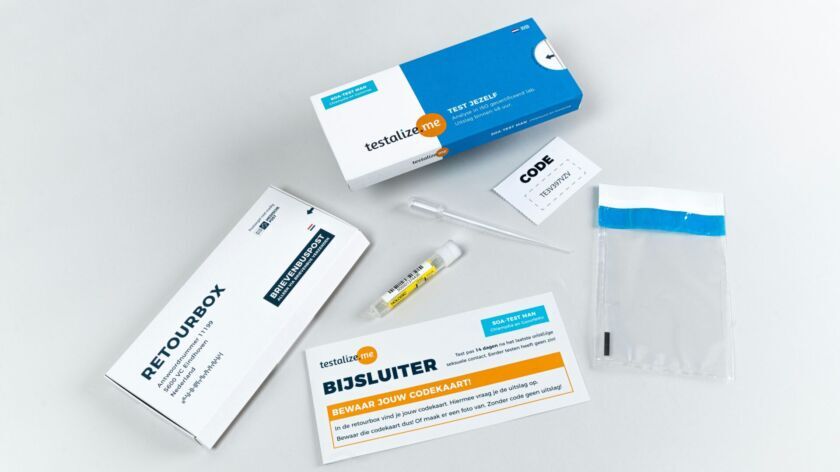Free STI testing at the GGD? Fewer young people in Nijmegen are eligible compared to other cities
-
 Photo via Unsplash
Photo via Unsplash
The GGD (Public Health Service) in Nijmegen is one of the few in the country that has a lower age limit for free STI testing. While the national standard is under 25 years, the limit here is 23. Students are disappointed about this. ‘For me, it's a reason to get tested less often.’
Across the Netherlands, young people under the age of 25 can make an appointment at the GGD if they suspect they have contracted an STI. That test is provided free of charge. Except at GGD Gelderland-Zuid, where testing is conducted at locations in Tiel and Nijmegen. This makes Nijmegen the only student city in the Netherlands where the test age is lower: up to 23 years instead of 25.
Students are unhappy about this. Business administration student Charlotte* (24) heard through the grapevine that she’s likely to have contracted an STI. ‘It’s never fun to hear, but unsafe sex does carry certain risks,’ she says.
So, she wants to get tested. But now, it’s no longer free at the GGD. Meanwhile, many of her friends who study in Brabant or Maastricht can still get tested for free. ‘I understand it’s my own responsibility, but excluding certain age groups seems irresponsible on the part of the GGD.’
Conscious Choice
After an analysis in 2015, GGD Gelderland-Zuid consciously decided to lower the age for free STI testing, explains GGD doctor Colette van Bokhoven, clarifying the difference. ‘A large portion of our time was spent testing students over the age of 22, and we found very few STIs among them.’
“We’d prefer to test all young people, but that’s simply not feasible”
Van Bokhoven disagrees with the notion that this policy constitutes age discrimination. ‘I see it more as optimal STI control. Ideally, we would test all young people, but that’s simply not feasible within the current framework.’
In 2014, the then-deputy minister imposed a funding cap due to the continual increase in the number of tests. As a result, GGD Gelderland-Zuid can conduct ‘only’ about 5,200 STI tests per year.

‘We’ve had to make choices,’ Van Bokhoven continues. ‘Additionally, all costs are rising, but funding isn’t keeping pace.’ Furthermore, the demand for STI testing is generally much higher than the supply. ‘Every GGD is struggling, but everyone makes different choices.’
Referred to a General Practitioner
The high demand for STI testing is also apparent to student Charlotte. She often finds herself being referred to a general practitioner (GP). ‘Even when I called the GGD in Brabant, where I’m from, I wasn’t allowed to test there because I no longer live there. But even if I had been allowed, they would still have referred me to a GP—they were simply too busy to schedule new people.’
Condom use not popular
In a previous article, it was revealed that having sex without a condom is quite common within certain student circles. Students indicated that they find sex without a condom more pleasurable or that putting one on can be a real mood killer. Like Charlotte, they also mentioned that they often ask if their partner is safe beforehand—and they trust their word on it.
‘I understand that it can’t be free, but I recently had to pay 70 euros,’ she continues. ‘And then on top of that, there was the cost of antibiotics because the test was positive. It ended up costing about 100 euros in total. For me, that’s a reason to get tested less frequently.’
The cost of an STI test at a general practitioner (GP) can vary widely. If you need to test for multiple STIs, it can cost up to 200 euros. If you haven’t reached your health insurance deductible, you’ll have to pay that out of your own pocket.
“The only way to prevent an STI is by using condoms.”
The high price of an STI test can be a barrier to getting tested. Van Bokhoven supports low-barrier access for everyone: ‘There are already initiatives to make STI tests more affordable. But for now, we have to make the best and fairest distribution possible with the budget and number of tests we have.’
According to the recent report ‘Sex Before 25,’ condom use among young people has significantly decreased. Does the GGD approach risk compromising the sexual health of young people? Van Bokhoven says: ‘Providing a free STI test alone doesn’t create sexual health. Prevention is always better than cure. And the only way to prevent an STI is by using condoms.’
What does Charlotte think of the prevention-is-better-than-cure principle? ‘I often don’t use a condom; sometimes, I don’t even think about it,’ she admits. ‘With the guy from whom I got the STI, I’d been having sex regularly for some time, so I eventually stopped using condoms. With a one-night stand, I usually ask beforehand if they might have an STI.’
*Charlotte prefers not to use her real name for privacy reasons. Her real name is known to the editorial team.
Translated by Nick Fidler



